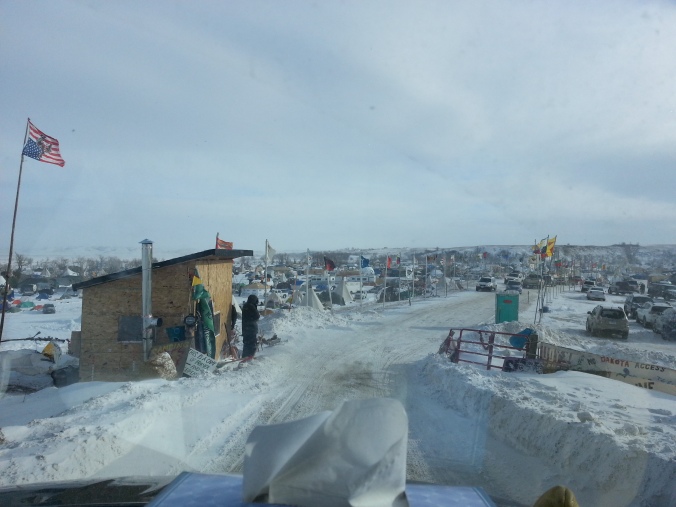
The person at the entrance asks if we have any alcohol, drugs or weapons. We assure him no, that we’re just coming to deliver a load of supplies and he directs us in. We head, as best we can, in the direction he’s pointed, get to a big U-Haul truck blocking the “road,” and stop. Rod gets out and vanishes. I have no idea what tent we’re looking for. The entrance guy had said, “See that green tent over there,” and pointed vaguely. I see lots of green tents and no clear road or path. People are everywhere, unloading wood from a truck, carrying stuff, walking bent into the wind, bundled up, many wearing ski masks and goggles. Everyone seems to know what they are doing. No one asks if I need directions. It seems like utter chaos.
I decide to wait in the truck to stay warm but realize that Rod has the keys, so after a few minutes decide to leave it unlocked and search for him. I weave through the tents following the narrow path where I saw him disappear. It reminds me of meandering through the old city in San Juan, Costa Rica, or many other places I haven’t been, like slums of India or favelas of Rio, but have seen in photos or films. Here the path is just trampled down snow that has become slick from many feet and I slip and wish I’d dug out my crampons when we’d stopped. Packed around the outside of the tents, insulating them, are hundreds of plastic bags filled with summer clothes. I pick my way around them and the piles of stuff–“Water is Life” and “#NoDAPL” signs, plywood sheets, propane canisters and such–lying seemingly randomly everywhere. Luckily I find Rod quickly and he has learned where to bring the bags of clothes and blankets.
We spend several hours unloading. Now I am so glad that I took the time before we left to sort and label everything. There is a tent for just Carhartts and warm outer coats for folks on the crew working in the cold. There is another tent for “civilians,” down jackets and such. We deliver boxes of propane canisters, hand-warmers, headlamps, batteries, flashlights, a solar charger, etc. to the Hardware tent, and ice chests filled with frozen organic carrots, and frozen meat (pork, lamb, a turkey), a large tub of butternut squash, many pounds of garlic, boxes of chicken broth and almond milk, rice, corn meal, quinoa, two cubic-foot cast iron propane cook stoves, and two beautiful, industrial size stainless-steel cooking pots to the food trailer and main kitchen.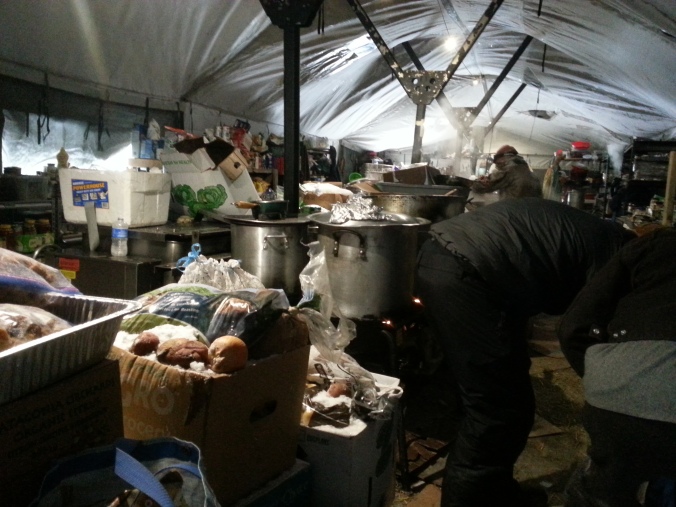 We bring snack stuff to the Mess Tent where a young woman is describing all the menu choices (including vegan options) and serving from big pots and trays cafeteria style. We stop for a few moments to devour some squash soup which is the best squash soup ever, despite the little hard chunks of something I can’t identify and keep picking out.
We bring snack stuff to the Mess Tent where a young woman is describing all the menu choices (including vegan options) and serving from big pots and trays cafeteria style. We stop for a few moments to devour some squash soup which is the best squash soup ever, despite the little hard chunks of something I can’t identify and keep picking out.
Each tent is surprisingly warm, many have either wood stoves or propane heaters. We have to crouch down, “igloo style” Rod says, to enter through the flaps that are covered with blankets or tarps, and then take a moment to adjust to the dim light inside. My glasses fog up entering each tent, then the lenses immediately freeze outside, so I decide to leave them in the truck and make due without. In the sunshine I can see pretty well; inside the tents not so much. Each time we ask for directions, to the Medical Tent or the horses, for instance, people are friendly and their directions extremely confusing. After hearing several times to cross, or follow, or turn at “Flag Road,” I eventually realize that the flying flags line a main thoroughfare and start to orient myself. 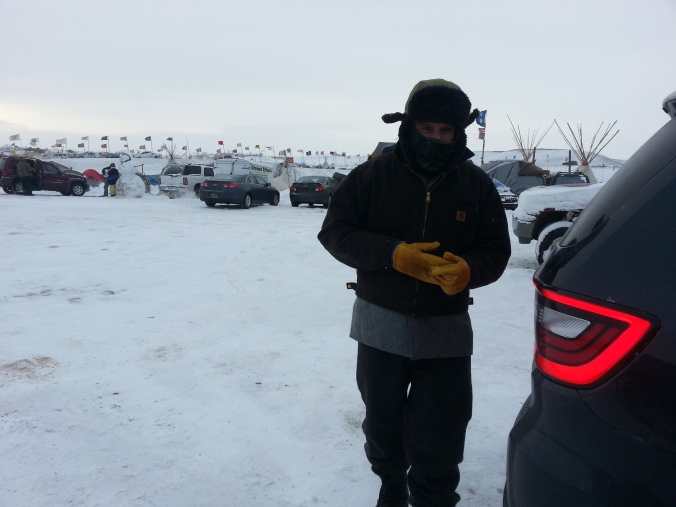 I also realize that the sheds we’ve been walking past, where people are sitting behind a plywood wind break, and announcements are being made, is actually the Sacred Fire. Somehow I hadn’t imagined the Sacred Fire to be so small or right in the hustle and bustle of the camp, but then I notice that people are sitting near it, praying quietly. I pull my long skirt out of my bag and slip it on over my snow pants, as requested on the Oceti Sakowin website as a sign of respect. I’d brought it a bit reluctantly, resistant (as I’ve been my whole life) to being instructed to dress according to a code. But wearing it is transformative. Suddenly I feel no longer an outsider, I feel as if I belong.
I also realize that the sheds we’ve been walking past, where people are sitting behind a plywood wind break, and announcements are being made, is actually the Sacred Fire. Somehow I hadn’t imagined the Sacred Fire to be so small or right in the hustle and bustle of the camp, but then I notice that people are sitting near it, praying quietly. I pull my long skirt out of my bag and slip it on over my snow pants, as requested on the Oceti Sakowin website as a sign of respect. I’d brought it a bit reluctantly, resistant (as I’ve been my whole life) to being instructed to dress according to a code. But wearing it is transformative. Suddenly I feel no longer an outsider, I feel as if I belong.
We begin to understand that there is little obvious central authority. Even though clearly there are volunteers doing many tasks, it’s unclear if there is a sign-up process for these jobs, or whether people just pitch in wherever needed. Other folks seem just to drift around. While we’re unloading our food crates and coolers into the food storage, I notice a young bearded man holding a Mexican blanket of mine that we’d used to wrap stuff in. He looks like he’s about to leave with it. He sees me watching him and says he’d noticed this blanket on the ground and it’s “beautiful and sacred,” and asks if I want it. I tell him it belongs to me and I’d like to keep it and that we’ve just delivered many warm blankets to the clothing tent if he needs one.
He follows us from tent to tent as we find the locations for various types of supplies; evidently he doesn’t have a job here at camp but he does try to help himself to our gloves while we are working at unpacking the cooking pots. I tell him we have just donated a large bag of very warm gloves to the clothing tent if he needs gloves. He asks where we’re from and it turns out that he’s a Vermonter also, from the Northeast Kingdom. Both Rod and I are politely trying to detach from him. He offers us many blessings and we continue trying to navigate the maze of tipis, tents, yurts and plywood shelters.
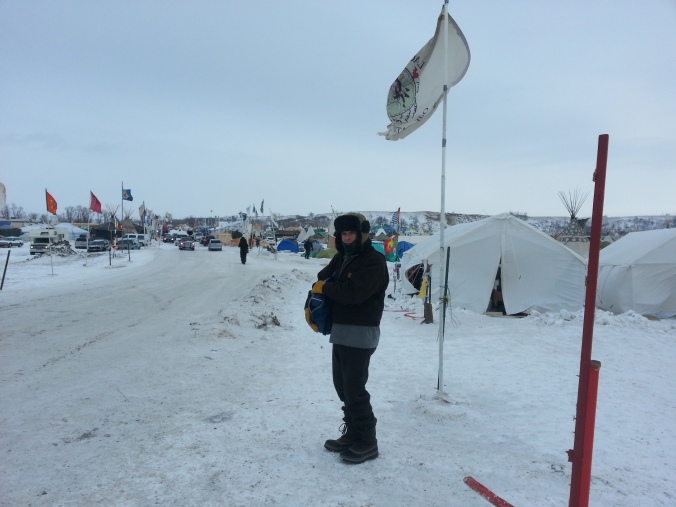
Eventually, we find each place we need: we deliver a bag of western medical supplies as well as healing herbs to the Medical Tent, and two 50 pound bags of feed to folks down at the horse corral. After locating the horses and searching for someone in charge, I ask some young Indian men walking past who we should talk to about horse donating the horse feed. They point to where the horses are hanging out, eating hay, not penned in and say to drive back and honk to get the owners of the horses to come out of their tents. “They’ll be mad at first when you honk, but then when they hear you have feed, they’ll be happy.” We manage to find some horse folks without honking. They do seem happy. Finally we locate the sewing tent—this time through the help of someone who takes the time to direct us step by step—on the outskirts (pun accidental) of camp to drop off the rolls and bags of fabric and ribbon.
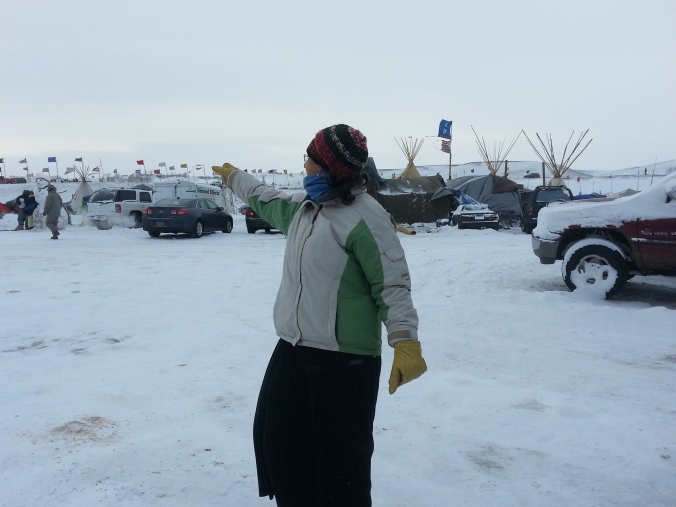
Before leaving we take time to enter the circle by the Sacred Fire. We place the packages of tobacco that we have brought on the pile of offerings, and are instructed to walk around the circle to the left, take a pinch of some tobacco and herbs (cedar) and to toss them into the fire with our prayers, then waft the smoke towards us. The gesture reminds me of the ritual of lighting Shabbat candles and the bringing the light into oneself. I feel awkward entering the ring around the fire, especially as I start to walk the wrong direction, and because prayer isn’t something with which I was raised so I often feel hesitant, as if I’m going to do something wrong and cause offense or embarrass myself. I don’t want to dishonor or insult. But after the first faux pas I enter the circle and kneel by the fire, expecting—I’m not sure exactly what to happen—something like thinking thoughts that I’m in charge of. Instead, as I place the herbs into the coals, I hear words: “May we heal the Earth together.” They come suddenly, not as if I chose or even thought them. I don’t know if I said them aloud but sat by the fire feeling surprised and moved, by the experience of having had this “prayer” come unbidden through me. After a few moments I notice that I am thinking more ordinary thoughts, noticing the fire itself, surprised that it is just a few logs and coals in an earthen pit, not the big blaze that I’d expected, so stand ready to leave. I am very happy that we spent these moments by this fire.
It becomes clear to us both that we need to head out fast We have accomplished what we set out to do. Now the weather is turning harsh again; the winds are wailing even more fiercely, the sun is getting low and the sky darkening with thick clouds. Though I had wanted to see the closed bridge, and mentioned several times that I wondered how to find it, when we leave we just head south. I briefly think that if we make a right turn out of the camp we’ll probably come to it quickly, but I don’t say this. It is scary cold outside and I want to make the drive back to the Grand River Casino before it is fully dark.
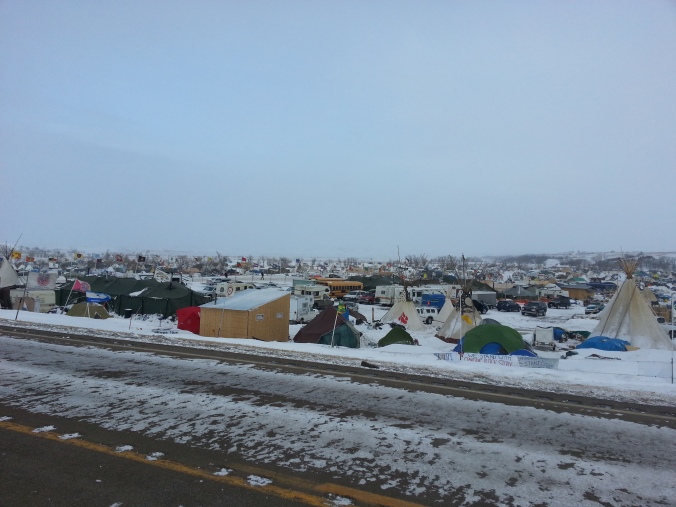
Thank you for sharing. Sounds like another world out there.
LikeLike